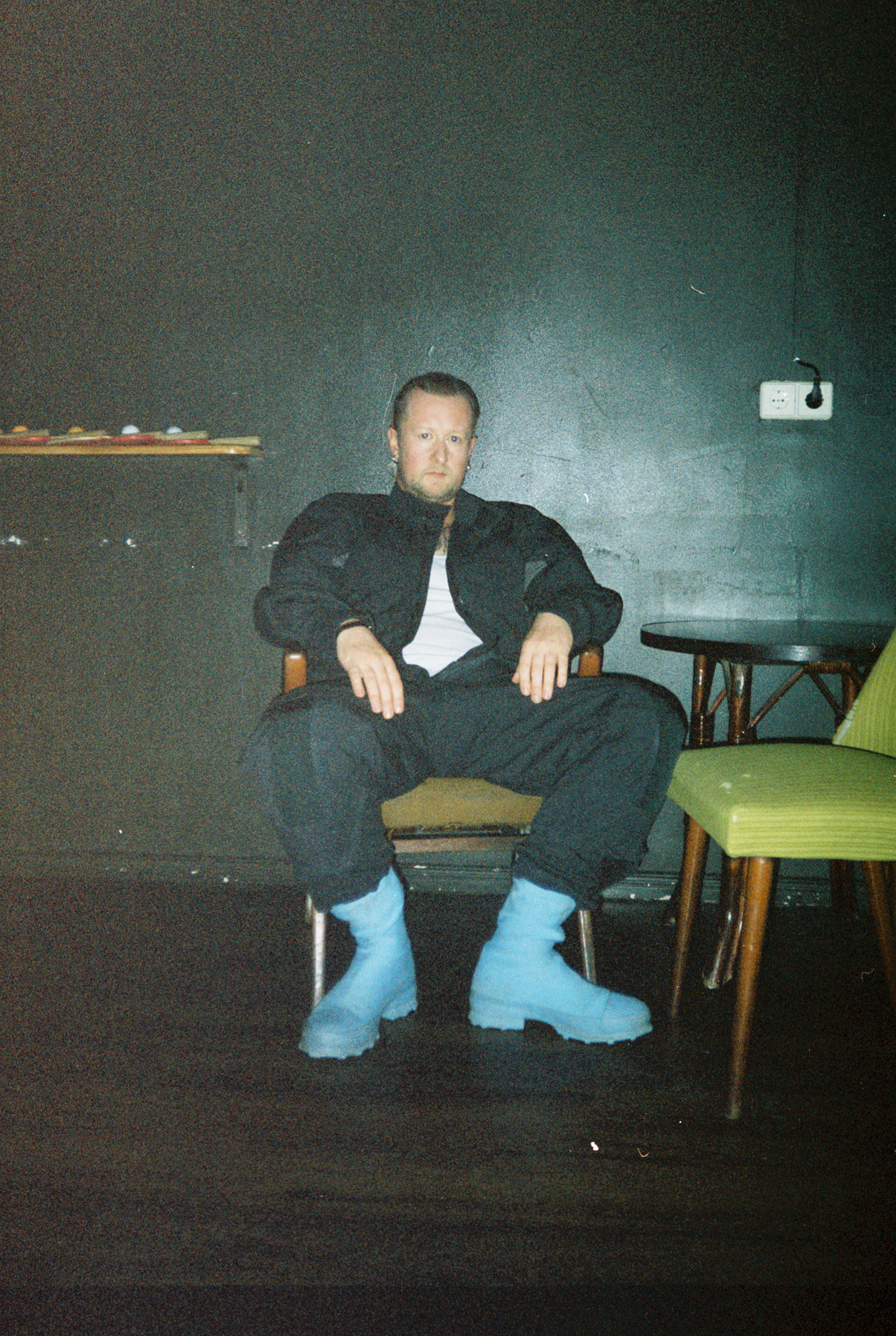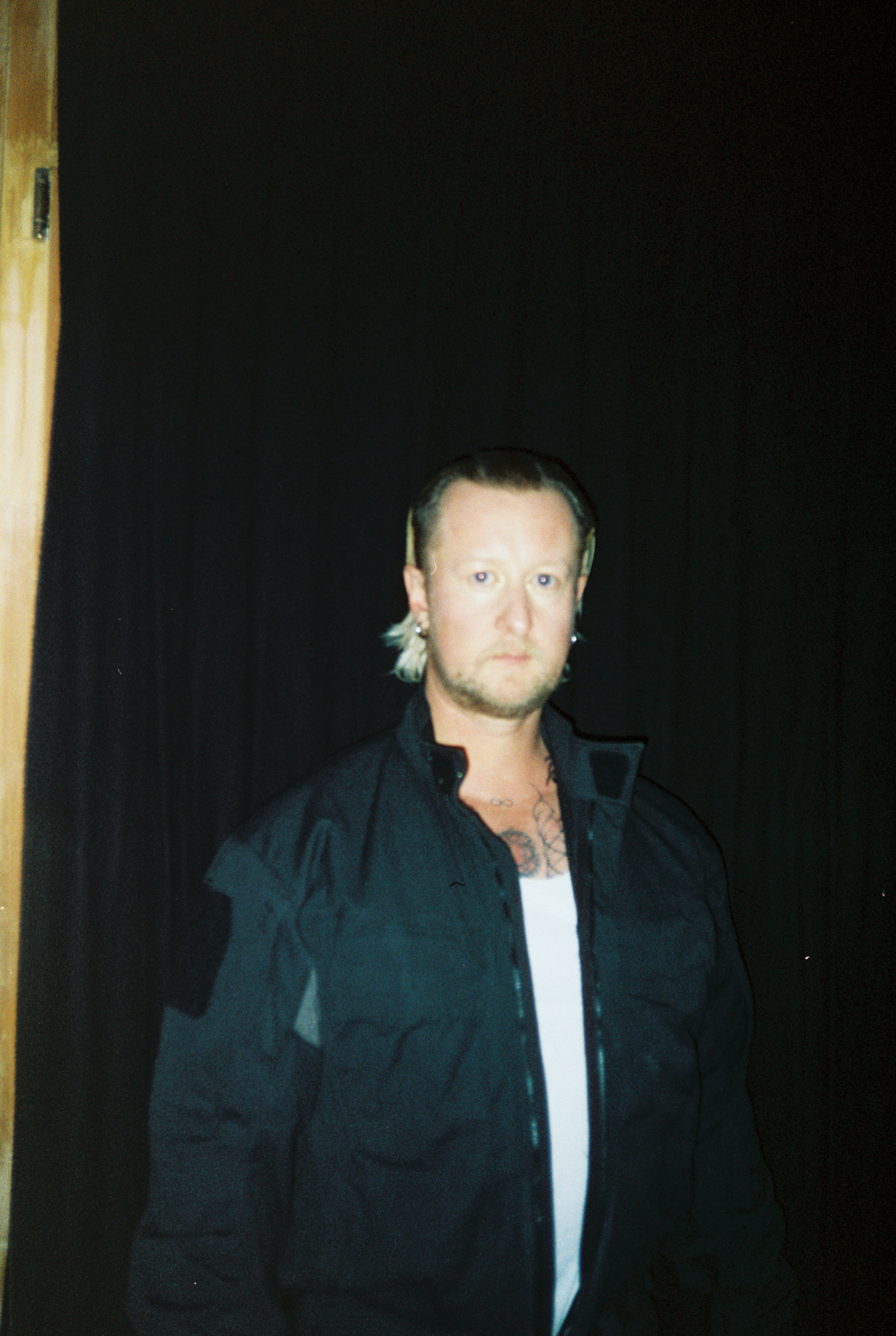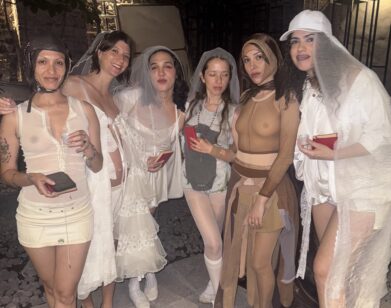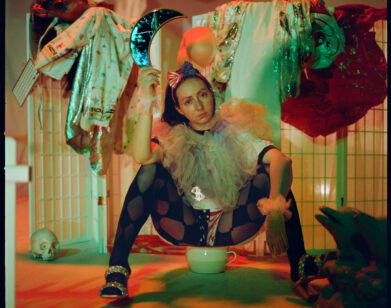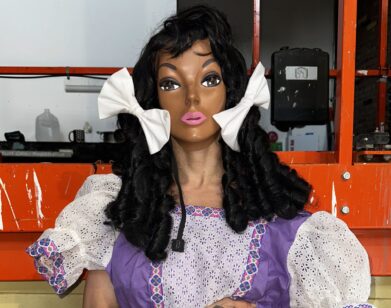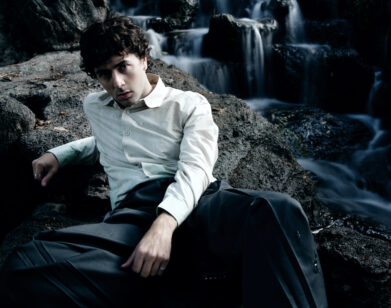INTERDIMENSIONAL
“I’ve Cried to Your Songs”: Colin Self and Eartheater Commune With the Spirit World
Colin Self is tapped in with their trickster self. It’s an archetype the multidisciplinary artist has had a lifelong relationship with, a mischievous spirit-world manifestation of the sentimentality that comes out in their work. From puppetry school to avant-drag with Hari Nef to opera with Raúl de Nieves, there are no limitations to Self’s expression. But their latest brainchild is the most pure and poignant yet. respite ∞ levity for the nameless ghost in crisis, released earlier this year, is a 12-track experimental pop album that Self describes as a “sonic shrine” to queer leaders, living and dead. Inspired by an encounter with the downtown art legend Agosto Machado, whose work graces the album cover, its delicate, pared-back vocals encourage us to celebrate and coalesce in times of crisis. To mark its release, dear friend and fellow musician Eartheater—who’s got her own project gestating: her first child—called up Self to talk post-apocalyptic processing, leaning into the obtuse, and learning to rule your demons.
———
COLIN SELF: How are you?
EARTHEATER: I’m so good. I just couldn’t help leaking a little of the news.
SELF: I was so happy to see it. A while ago, Monica [Mirabile] and I were talking about you and somehow I had this inkling that you were going to have a baby, and I said something and Monica made this face like she already knew something. I was like, “Ahh!” but I didn’t ask yet.
EARTHEATER: Well, a few of my friends had inklings, so it would make sense that you were one of them. You’re going to be an uncle. This baby’s so lucky that she’s going to have so many amazing people in her life. The love and the wisdom and the music and the art, it’s going to be magic.
SELF: This baby will be very wise.
EARTHEATER: Speaking of babies dropping, I love the new album.
SELF: Thank you so much.
EARTHEATER: I can’t wait to play it for her when she’s nursing. The first song on the album is like a lullaby. A very cool masseuse told me that when you’re nursing your baby, you pick a few songs that you always play every single time, so this is a major compliment. Then you can start playing them softly in the room when they need to sleep, so they associate it with being nurtured and cozy and physical contact and it puts them to sleep. Then throughout their childhood, when you really need to calm them down, you play one of these songs.
SELF: I really love that. Also, I always think about the gestation period as the spirit coming into this person. The whole record is very much for that type of interdimensional communication. It’s the process by which a star seed or a soul chooses to enter the body, and I love that my music could be there for that. That’s an honor and a joy.
EARTHEATER: So the first song is called “respite for the tulpamancer.” What does that mean for the rest of us?
SELF: Tulpamancy originally began as a Tibetan Buddhist meditation process of being in conversation with your shadow, but it’s developed an entirely new meaning in online youth subculture of people feeling connected to the parts of themselves that otherwise might feel difficult to sit with. That song is like an embrace to oneself, so this process of tulpamancy has a long, deep history. But for me, it has to do with sitting with and befriending the shadow.
EARTHEATER: It’s reminding me of this quote like, “You can’t get rid of your demons. You have to get to know them because they’re part of you and then you can rule them.” But also, it’s like the word duende. It’s like a cuter demon as opposed to a negative one.
SELF: It’s called duende?
EARTHEATER: It’s a Spanish word for a little cheeky spirit, but it’s also associated with genius too, because it’s an adjective often used to describe musicians that can play one note for an extended period and never lose the sense of moment. It’s the capturing of the emotion and ASMR goosebumps within the limitation of just one note. They call that the duende. I feel like all of that comes down to being really sensitive and allowing yourself to feel everything, and that’s what I feel from the song.
SELF: It really relates in that sense. I was so drawn to all of these shadow themes because so often they’re the things we don’t want to face, but there is this wisdom that exists in the depths of these challenging or complex parts of ourselves. For me, historically, what’s made music so powerful is the transformative quality of being with the emotions that are not the easiest. I’ve cried many times to your songs. I remember when you played a show in Berlin, and someone had told you in the audience that their father had passed away and that this song meant a lot. I was crying. The whole room was crying. It was so beautiful that we all were able to be with a stranger’s story of grief in this music space. Then when you played the song, I looked around and we’re all weeping and having this collective experience.
EARTHEATER: It exorcises the emotions and diffuses them, but everything is a vibration. The inexplicable, supernatural things have a vibration too, even though you don’t see them. You said “Tie a ribbon to my ghost.” I love that line. Talk more about that.
SELF: This actually goes back to the trickster archetype, which I’ve had a lifelong relationship with. There was a moment where I was meeting with Asher Hartman, who I call a spiritual guidance counselor who delivers transmissions from the spirit world. There was a specific thing about the trickster spirit world Colin having ribbons that I tie onto things to commemorate the past. In the process of doing so, I was also making these puppets and I found myself tying a ribbon to the wrist or the ankle and then doing that to myself. I love the idea of this energetic ribbon. I mean, the word “lemniscate,” which is the infinity sign, actually translates to “decorated with ribbons.” So as a thematic material of the album, ribbons have been very present.
EARTHEATER: Beautiful. I love hearing what the actual infinity symbol is called, because look. [Shows tattoo]
SELF: Oh yes, we both have them. Look.
EARTHEATER: Oh, yeah. I’m going to include the infinity symbol as one of the logos for the new album, but one side of the infinity circle is a tear. But when you said “tie a ribbon to my ghost,” it reminded me of this hilarious video where this kid was terrified of her shadow, and she’s walking through this parking lot and suddenly realizes that she can’t escape it. She’s running around screaming. It’s very funny to watch. But I was just thinking that so much of what terrifies us is just because we don’t understand it. I processed a lot when I was listening to your song about how I’m going to guide this little person through life when she’s going to be so terrified of things that she’s actually in control of. Then I think the algorithm figured out that I liked these shadow baby videos, so it showed me another one where the baby was thrilled that he could control it. I just thought it was a gorgeous metaphor for artists.
SELF: Yeah, it’s just like you said, all of these feelings are frequencies. Fear is a frequency, and to move through fear into a place of wonder is such a vital pathway. I learned something from a neurologist that the brain cannot experience fear and curiosity at the same time. As a result, there’s all of these somatic or cognitive prompts you can do to move the brain into that state.
EARTHEATER: Oh my gosh. Yeah, I actually get being scared of crazy creatures and animals. It’s the fear of parts of ourselves that I am frustrated with. I want to read your lyrics right now. I had so much fun reading them, and I also had so much fun reading the credits of the album because there’s so many amazing people that worked on it.
SELF: I know. I feel so blessed. The process of facing the shadows was a challenge at first because it was such a solitary concept and I felt a sense of lostness, but then Nick and Cecile and Ben would be like, “Colin, you make music like this.” They would literally play me one of my songs. It sounds so silly and arbitrary, but these moments really opened something up in me. I actually made an entire album and scrapped it and then made this instead because I needed to go through that journey of lost and found.
EARTHEATER: Did you salvage parts of it?
SELF: I did. Three or four of the songs that made it to the record, I had recorded with a band, and now that the record is finished I’m returning to all these other songs. I am seeing and hearing them with new ears.
EARTHEATER: All is not lost. Sometimes they just need time. Sometimes it’s wiser than us, the work. It’s never just recording an album to me. It always needs to gestate and to ferment, and I need to hear highly critical feedback. Then I need to hear very luscious feedback. I just love that process and I love hearing that I’m not the only one.
SELF: I mean, so much of this record was also connecting with Baby Colin, the artist and the person who I was when I was 18, moving to Olympia to make puppets and experimental writing.
EARTHEATER: I want to talk about that too.
SELF: I have this whole record, Kelsey & The Dead Flock Girls, that I made in 2008. I listened to it recently and I was like, “This is so beautiful.” But there were things that I was like, “What are the compositional or aesthetic ties that I have to my teenage self that I can tie that ribbon back to?”
EARTHEATER: Isn’t it amazing the way that time sheds a whole new light on things? I hear a timeless ribbon in this music for sure. I hear a lot of the Colin tropes. I hear the glitched out vocals and the choral stuff and the Latin, but there are parts of it that feel really fresh and strong and extremely unabashed. The glitchy vocals are incredible, but the directness of some of these songs is so fresh and it’s the first time I’ve ever heard that from you. It feels youthful.
SELF: Thank you. I really did have some very nakey parts of this record where I was like, “Okay, I’m not doing any processed vocals. This is Colin Self with no VST, no vocal processing.” I’m just singing and listening to my own voice. I’m reminded of who Colin Self is when I take everything else away.
EARTHEATER: That comes back to the first thing we were talking about, tying ribbons to our ghosts and embracing all of it. It’s really brave to sing without processing. It really is.
SELF: It’s scary.
EARTHEATER: Did you autotune?
SELF: There’s autotune on some of it, but the nakey parts, there’s no autotune.
EARTHEATER: Sometimes, you have to have a little pitchiness to show the emotion.
SELF: It’s true. I think I have okay pitch. But I do believe in autotune and all of these materials that we work with are also sacred in their own ways and have the capacity to convey something that is also divine. I’m going through this process right now, which is unfolding a false binary between the sacred and the profane, and so often they’re actually not that far away from each other.
EARTHEATER: For instance, the macaroni sound on the album. How did you make it?
SELF: The macaroni sound?
EARTHEATER: The super wet, squelchy sound. It sounds profane.
SELF: It is profane. That sound is from when I was with Nick and Cecile, and I was joking on the microphone like, [Macaroni sounds]. They were like, “Wait. Colin, do that.” I was like, “You guys, that’s so—
EARTHEATER: Oh my god.
SELF: And it’s so tactile. You’re right up against the mouth. So eventually I fell in love with it too.
EARTHEATER: That’s like post-apocalyptic processing. What if society collapses and we have no way to process our vocals anymore? We’re going to have to embrace these macaroni sounds we can make with our voice.
SELF: It’s going to be a beautiful part of the collapse.
EARTHEATER: That’s the way I’m seeing the positive in this whole AI thing. If AI can replicate everything, can it replicate our madness and our obtuse noise? I think it’s going to spiral a whole new movement of very unpredictable artistic expressions, because that’s the whole thing about it. It’s dependent on predictability.
SELF: I mean, does AI have a soul or a spirit? I was raised under the Haraway cyborg. There’s not a nature and a non-nature. It’s all one, and there is something to those nuanced and slightly unnerving, nasty parts of our craziness that we don’t consider when we think about the potential spirit of artificial intelligence.
EARTHEATER: Well, we just haven’t informed it of that very much. We’ve been informing it of perfection, of people following a format or a code and polishing things to be considered “good.” There’s much less obtuse experimental work because maybe it’s been blaspheming the perfect, structured formula. Maybe later it’ll learn to be that. I’m not necessarily threatened by it, but I am curious how it will change output and expression. It’s not interesting anymore if there’s no effort that goes into it. Effort and overcoming, I think, is what we search for a lot in work.
SELF: Yeah.
EARTHEATER: So I think it will open up a whole new palette for the bravery that it takes to make obtuse strange sounds, which your album is also exemplifying.
SELF: Yeah, I really had to lean into the obtuse with this record. I felt the need to not be spectacular in the face of this race for everything to be the best and most incredible. Wandering and being contemplative and uncertain and playful and illogical is vital to the art that I make. And I needed to make a love letter to both seven-year-old Colin and 70-year-old Colin and affirm those parts of myself that are a little bit strange, because you know me very well. I’m a little strange.
EARTHEATER: That’s infinitely curious and perfect. I have to go, but what a beautiful way to end.
SELF: I’m so excited for the baby music. A lot of people make my favorite record after they have their baby, like Madonna’s Ray of Light.
EARTHEATER: The baby music’s pretty good. It’s starting already, so I’m excited too. I love you so much.
SELF: I love you, Alex.

